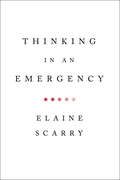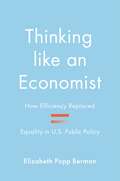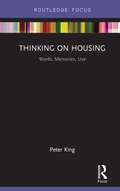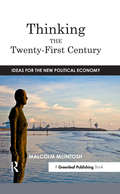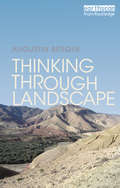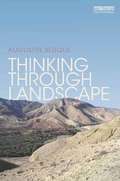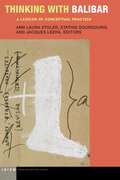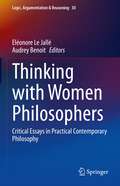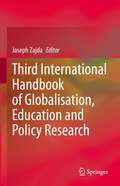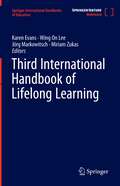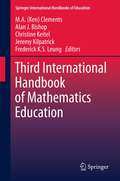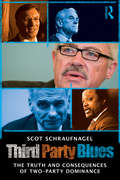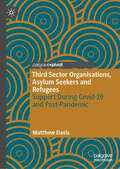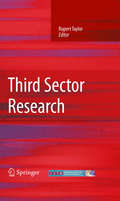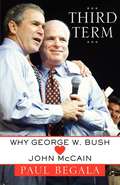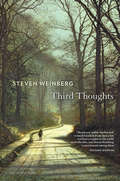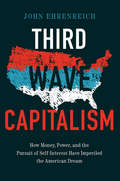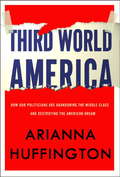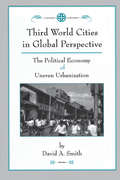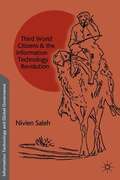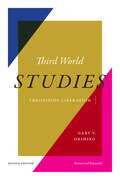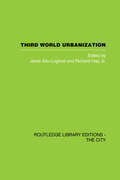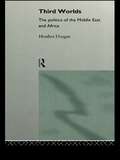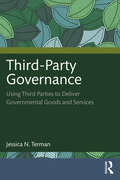- Table View
- List View
Thinking in an Emergency (Norton Global Ethics Series)
by Elaine ScarryAward-winning critic Elaine Scarry provides a vital new assessment of leadership during crisis that ensures the protection of democratic values. In Thinking in an Emergency, Elaine Scarry lays bare the realities of "emergency" politics and emphasizes what she sees as the ultimate ethical concern: "equality of survival." She reveals how regular citizens can reclaim the power to protect one another and our democratic principles. Government leaders sometimes argue that the need for swift national action means there is no time for the population to think, deliberate, or debate. But Scarry shows that clear thinking and rapid action are not in opposition. Examining regions as diverse as Japan, Switzerland, Ethiopia, and Canada, Scarry identifies forms of emergency assistance that represent "thinking" at its most rigorous and remarkable. She draws on the work of philosophers, scientists, and artists to remind us of our ability to assist one another, whether we are called upon to perform acts of rescue as individuals, as members of a neighborhood, or as citizens of a country.
Thinking like an Economist: How Efficiency Replaced Equality in U.S. Public Policy
by Elizabeth Popp BermanThe story of how economic reasoning came to dominate Washington between the 1960s and 1980s—and why it continues to constrain progressive ambitions todayFor decades, Democratic politicians have frustrated progressives by tinkering around the margins of policy while shying away from truly ambitious change. What happened to bold political vision on the left, and what shrunk the very horizons of possibility? In Thinking like an Economist, Elizabeth Popp Berman tells the story of how a distinctive way of thinking—an “economic style of reasoning”—became dominant in Washington between the 1960s and the 1980s and how it continues to dramatically narrow debates over public policy today.Introduced by liberal technocrats who hoped to improve government, this way of thinking was grounded in economics but also transformed law and policy. At its core was an economic understanding of efficiency, and its advocates often found themselves allied with Republicans and in conflict with liberal Democrats who argued for rights, equality, and limits on corporate power. By the Carter administration, economic reasoning had spread throughout government policy and laws affecting poverty, healthcare, antitrust, transportation, and the environment. Fearing waste and overspending, liberals reined in their ambitions for decades to come, even as Reagan and his Republican successors argued for economic efficiency only when it helped their own goals.A compelling account that illuminates what brought American politics to its current state, Thinking like an Economist also offers critical lessons for the future. With the political left resurgent today, Democrats seem poised to break with the past—but doing so will require abandoning the shibboleth of economic efficiency and successfully advocating new ways of thinking about policy.
Thinking on Housing: Words, Memories, Use (Routledge Focus on Housing and Philosophy)
by Peter KingIf we do stop to think on housing, what do we see? What is housing and what does it do? These seem deceptively simple questions, but they are often left unanswered. The reason for this is that a lot of discourse on housing is really a concern for policy-making and the critical evaluation of existing policies. Discourse, is not, properly speaking, on housing at all. It is concerned with provision, distribution and access, but this thinking on housing stops at the front door. It is only concerned with what is actually external to housing. But for most people, housing already exists and they have access to it. Housing is not then about policy, but about how we can use what is a complex object in a manner that allows us to live well. Housing, for most of us, is about what we do when the front door is firmly shut and we are free from the external world. These essays explore this idea of housing as an object that exists for use. Housing is pictured as an object that contains activity. These pieces look at what we do with housing once we have it and so provides a necessary underpinning for any understanding of why housing is important. A further purpose of these pieces is to present different ways of thinking and writing on housing. It is an attempt to show that housing is a suitable topic for philosophical discourse. It is suggested that we can and should seek to establish a philosophy of housing, rather than just relying on the traditional social sciences.
Thinking the Twenty‐First Century: Ideas for the New Political Economy
by Malcolm McIntoshIn a sophisticated and far-reaching blend of theory and reflection, Thinking the Twenty-First Century takes a provocative look at the changes required to build a new global political economy. McIntosh charts five system changes essential to this transition: globality and Earth awareness; the rebalancing of science and awe; peacefulness and the feminization of decision-making; the re-organization of our institutions; and, evolution, adaptation and learning. That they are all connected should be obvious, but that they are written about together is less common.McIntosh argues that these five changes are already under way and need to be accelerated. Combining science, philosophy, politics and economics, Thinking the Twenty-First Century questions our current model of capitalism and calls for a much-needed new order. This forceful call to action advocates a balanced political economy with trandisciplinarity, connectivity, accountability and transparency at its centre, as an alternative to a world built on the failing system of neoliberal economics.From one of the pioneers of the global corporate sustainability and social responsibility movement, this unique book combines analysis, diary and reflection to present a radical way forward for the twenty-first century.
Thinking through Landscape
by Augustin BerqueOur attitude to nature has changed over time. This book explores the historical, literary and philosophical origins of the changes in our attitude to nature that allowed environmental catastrophes to happen.The book presents a philosophical reflection on human societies’ attitude to the environment, informed by the history of the concept of landscape and the role played by the concept of nature in the human imagination. It features a wealth of examples from around the world to help understand the contemporary environmental crisis in the context of both the built and natural environment. Berque locates the start of this change in human labour and urban elites being cut off from nature. Nature became an imaginary construct masking our real interaction with the natural world. He argues that this gave rise to a theoretical and literary appreciation of landscape at the expense of an effective practical engagement with nature. This mindset is a general feature of the world's civilizations, manifested in similar ways in different cultures across Europe, China, North Africa and Australia. Yet this approach did not have disastrous consequences until the advent of western industrialization.As a phenomenological hermeneutics of human societies’ environmental relation to nature, the book draws on Heideggerian ontology and Veblen’s sociology. It provides a powerful distinction between two attitudes to landscape: the tacit knowledge of earlier peoples engaged in creating the landscape through their work - “landscaping thought”- and the explicit theoretical and aesthetic attitudes of modern city dwellers who love nature while belonging to a civilization that destroys the landscape - “landscape thinking”. This book gives a critical survey of landscape thought and theory for students, researchers and anyone interested in human societies’ relation to nature in the fields of landscape studies, environmental philosophy, cultural geography and environmental history.
Thinking through Landscape
by Augustin BerqueOur attitude to nature has changed over time. This book explores the historical, literary and philosophical origins of the changes in our attitude to nature that allowed environmental catastrophes to happen. It presents a philosophical reflection on human societies’ attitude to the environment, informed by the history of the concept of landscape and the role played by the concept of nature in the human imagination and features a wealth of examples from around the world to help understand the contemporary environmental crisis in the context of both the built and natural environment. Thinking Through Landscape locates the start of this change in human labour and urban elites being cut off from nature. Nature became an imaginary construct masking our real interaction with the natural world. The book argues that this gave rise to a theoretical and literary appreciation of landscape at the expense of an effective practical engagement with nature. It draws on Heideggerian ontology and Veblen’s sociology, providing a powerful distinction between two attitudes to landscape: the tacit knowledge of earlier peoples engaged in creating the landscape through their work - "landscaping thought"- and the explicit theoretical and aesthetic attitudes of modern city dwellers who love nature while belonging to a civilization that destroys the landscape - "landscape thinking". This book gives a critical survey of landscape thought and theory for students, researchers and anyone interested in human societies’ relation to nature in the fields of landscape studies, environmental philosophy, cultural geography and environmental history.
Thinking with Balibar: A Lexicon of Conceptual Practice (Idiom: Inventing Writing Theory)
by Ann Laura Stoler, Stathis Gourgouris and Jacques LezraThis volume, the first sustained critical work on the French political philosopher Étienne Balibar, collects essays by sixteen prominent philosophers, psychoanalysts, anthropologists, sociologists, and literary critics who each identify, define, and explore a central concept in Balibar’s thought. The result is a hybrid lexicon-engagement that makes clear the depth and importance of Balibar’s contribution to the most urgent topics in contemporary thought. The book shows the continuing vitality of materialist thought across the humanities and social sciences and will be fundamental for understanding the philosophical bases of the contemporary left critique of globalization, neoliberalism, and the articulation of race, racism, and economic exploitation.Contributors: Emily Apter, Étienne Balbar, J. M. Bernstein, Judith Butler, Monique David-Ménard, Hanan Elsayed, Didier Fassin, Stathis Gourgouris, Bernard E. Harcourt, Jacques Lezra, Patrice Maniglier, Warren Montag, Adi Ophir, Bruce Robbins, Ann Laura Stoler, Gary Wilder
Thinking with Women Philosophers: Critical Essays in Practical Contemporary Philosophy (Logic, Argumentation & Reasoning #30)
by Eléonore Le Jallé Audrey BenoitThis book focuses on some English-speaking women philosophers who have been major actors since the 20th century in the field of practical philosophy, namely political and social philosophy, feminist approaches to philosophy, moral psychology, the theory of action and ethics. The book explores topics linked to the main aspects of the thought of those philosophers, i.e. Elizabeth Anscombe, Judith Butler, Philippa Foot, Nancy Fraser, Carol Gilligan and Martha Nussbaum. Six women French commentators have written a chapter on each of those women anglo-american philosophers, creating a dialogue as they think with them, elaborating their own positions in their respective fields.
Third International Handbook of Globalisation, Education and Policy Research
by Joseph ZajdaThis handbook presents a global overview of current research in education and education policy reforms during the last decade. It provides an accessible, practical and comparative source of current research that examines the intersecting and diverse discourses of this important issue. It first examines globalisation, education and policy research and reforms in higher education, including coverage of main trends in education and policy reforms globally, as well as specific policy issues such as gender, equity, minorities and human rights. Next, the handbook offers a comparative perspective that evaluates the ambivalent and problematic relationship between globalisation, the state and education reforms globally. It features coverage on curricula issues and education reforms in schools around the world, the curriculum in the global culture, as well as globalisation and education futures, with respect to social justice and human rights.The handbook contributes to a better and a more holistic understanding of the education reforms and research nexus—offering possible strategies for the effective and pragmatic policy planning and implementation at the local, regional and national levels. It will serve as a vital sourcebook of ideas for researchers, practitioners and policy makers in education.
Third International Handbook of Lifelong Learning (Springer International Handbooks of Education)
by Karen Evans Wing On Lee Miriam Zukas Jörg MarkowitschThe Third edition of this well-received and widely used Handbook brings together an entirely new set of chapters, to reflect progress and new themes in the ten years to 2022. Building on the established structure of the first two Handbooks, the four sections focus in turn on: philosophy, history and theory development; fresh perspectives on policy and policy development; emerging programs and new approaches; and re-imagining lifelong learning for future challenges.The Handbook stimulates readers with fresh and timely insights, while exploring anew some enduring themes. New topics and themes introduced in all sections address lifelong learning challenges associated with climate change, the digital world, the rise of populism, migration and precarious living. The Handbook features learning innovations and evolving pedagogies such as intergenerational learning, art as pedagogy to promote public-mindedness, neuroscience enhancing learning effectiveness, and lifelong learning for sustainability. Policy responses to lifelong learning for work and well-being are debated.In state of the art contributions, authors from around the globe focus readers' attention on multifaceted processes, issues and decisions that must be better understood and enacted if inclusive development and fair access to lifelong learning are to become realities for us all.
Third International Handbook of Mathematics Education
by Frederick K.S. Leung M. A. Ken Clements Alan J. Bishop Jeremy Kilpatrick Christine Keitel-KreidtThe four sections in this Third International Handbook are concerned with: (a) social, political and cultural dimensions in mathematics education; (b) mathematics education as a field of study; (c) technology in the mathematics curriculum; and (d) international perspectives on mathematics education. These themes are taken up by 84 internationally-recognized scholars, based in 26 different nations. Each of section is structured on the basis of past, present and future aspects. The first chapter in a section provides historical perspectives ("How did we get to where we are now?"); the middle chapters in a section analyze present-day key issues and themes ("Where are we now, and what recent events have been especially significant?"); and the final chapter in a section reflects on policy matters ("Where are we going, and what should we do?"). Readership: Teachers, mathematics educators, ed.policy makers, mathematicians, graduate students, undergraduate students. Large set of authoritative, international authors.
Third Party Blues: The Truth and Consequences of Two-Party Dominance (Controversies in Electoral Democracy and Representation)
by Scot SchraufnagelMore than many areas of American politics research, studies of minor party competition and success are often overly driven by normative concerns that do not hold up to empirical scrutiny. This concise book presents a concerted effort to analyze the barriers in election law, such as ballot access restrictions and single member districts with a plurality rule, that prevent third parties from gaining a durable hold in American politics. Rather than trudge through yet another history of third parties in America or polemical arguments for minor party inclusion, Schraufnagel provides empirical grounding for the claims of third party backers. This thoughtful analysis demonstrates that the inclusion of third parties improves electoral participation rates and that third party involvement in the legislative process is linked to landmark legislative productivity. In the end, the work provides thoughtful suggestions on the types of reforms that would lead to greater third party success in American elections.
Third Sector Organisations, Asylum Seekers and Refugees: Support During Covid-19 and Post-Pandemic
by Matthew DavisThis short Pivot explores the the physical, emotional, and psychological impact of the lived experiences of asylum seekers on the staff and volunteers of third sector organisations who assist and support them. This research casts a direct light on the issues, challenges, and barriers of their work during and after the pandemic. It seeks to pinpoint the needs of staff which should be addressed by employers of third sector organisations to improve efficiency and wellbeing from an operational viewpoint, a mental health lens and psychological perspective. It adopts a Constructivist Grounded Theory (CGT) — a qualitative research method that involves co-constructing theories with participants. The research effectively examines how frontline organisations need to change given the social, economic and political challenges faced by asylum seekers and refugees in accessing support alongside the impact of new Government immigration, asylum policies and new legislation at that time. It also provides insights into the lived experiences of asylum seekers and refugees.
Third Sector Research
by Rupert TaylorTo mark the 20th Anniversary of Voluntas: International Journal of Voluntary and Nonprofit Organizations the editor has compiled a comprehensive overview of contemporary debates in third sector scholarship, comprised of all original research by leaders in the field. The volume will offer a critical review of the central and innovative themes that have come to form the core of third sector debate and research with an international focus. The first global compendium of third sector research, this volume provides a international, multi-disciplinary, and state-of-the-art overview of the field. The contributions not only examine and review the existing scholarship, but introduce new perspectives and thinking on the third sector--especially in terms of future implications around the world. Topics covered include: -History and Development of the Field -New Trends in Volunteering and Philanthropy -Volunteering and Participation in Developing Countries -Leadership and Governance -Corporate Responsibility -Social Capital -Global Civil Society This seminal volume provides a broad and comprehensive look at the field of Third Sector Research, of primary interest to researchers in political science, sociology, development studies, and nonprofit leadership programs.
Third Term
by Paul BegalaFor Democrats, Independents, and the majority of Republicans who are fed up with the GOP, a handbook for the most important election in our lifetime. With the indispensable chapters: The John McCain Quiz and Things John McCain is Older Than. In details that will surprise even close followers of the political scene, veteran political strategist Paul Begala thoroughly makes the case that John McCain would be a third term for George W. Bush. He explodes the myth that John McCain is a maverick, and proves powerfully that he's just four more years of the same old thing.
Third Thoughts
by Steven WeinbergOne of the world’s most captivating scientists challenges us to think about nature’s foundations and the entanglement of science and society. Steven Weinberg, author of The First Three Minutes, offers his views on fascinating aspects of physics and the universe, but does not seclude science behind disciplinary walls, or shy away from politics.
Third Wave Capitalism: How Money, Power, and the Pursuit of Self-Interest Have Imperiled the American Dream
by John EhrenreichIn Third Wave Capitalism, John Ehrenreich documents the emergence of a new stage in the history of American capitalism. Just as the industrial capitalism of the nineteenth century gave way to corporate capitalism in the twentieth, recent decades have witnessed corporate capitalism evolving into a new phase, which Ehrenreich calls "Third Wave Capitalism." Third Wave Capitalism is marked by apparent contradictions: Rapid growth in productivity and lagging wages; fabulous wealth for the 1 percent and the persistence of high levels of poverty; increases in the standard of living and increases in mental illness, personal misery, and political rage; the apotheosis of the individual and the deterioration of democracy; increases in life expectancy and out-of-control medical costs; an African American president and the incarceration of a large percentage of the black population. Ehrenreich asserts that these phenomena are evidence that a virulent, individualist, winner-take-all ideology and a virtual fusion of government and business have subverted the American dream. Greed and economic inequality reinforce the sense that each of us is “on our own.” The result is widespread lack of faith in collective responses to our common problems. The collapse of any organized opposition to business demands makes political solutions ever more difficult to imagine. Ehrenreich traces the impact of these changes on American health care, school reform, income distribution, racial inequities, and personal emotional distress. Not simply a lament, Ehrenreich's book seeks clues for breaking out of our current stalemate and proposes a strategy to create a new narrative in which change becomes possible.
Third World America: How Our Politicians Are Abandoning the Average Citizen
by Arianna HuffingtonIt's not an exaggeration to say that middle-class Americans are an endangered species and that the American Dream of a secure, comfortable standard of living has become as outdated as an Edsel with an eight-track player. That the United States of America is in danger of becoming a third world nation. The evidence is all around us: Our industrial base is vanishing, taking with it the kind of jobs that have formed the backbone of our economy for more than a century; our education system is in shambles, making it harder for tomorrow's workforce to acquire the information and training it needs to land good twenty-first century jobs; our infrastructure--our roads, our bridges, our sewage and water, our transportation and electrical systems--is crumbling; our economic system has been reduced to recurring episodes of Corporations Gone Wild; our political system is broken, in thrall to a small financial elite using the power of the checkbook to control both parties. And America's middle class, the driver of so much of our economic success and political stability, is rapidly disappearing, forcing us to confront the fear that we are slipping as a nation - that our children and grandchildren will enjoy fewer opportunities and face a lower standard of living than we did. It's the dark flipside of the American Dream - an American Nightmare of our own making. Arianna Huffington, who, with the must-read Huffington Post, has her finger on the pulse of America, unflinchingly tracks the gradual demise of America as an industrial, political, and economic leader. In the vein of her fiery bestseller Pigs at the Trough, Third World America points fingers, names names, and details who's killing the American Dream. Finally, calling on the can-do attitude that is part of America's DNA, Huffington shows precisely what we need to do to stop our freefall and keep America from turning into a third world nation. Third World America is a must-read for anyone disturbed by our country's steady descent from 20th century superpower to backwater banana republic.From the Hardcover edition.
Third World Atlas
by Ben Crow Alan Thomas Paul Frenz Tom Hewitt Sabrina Kassam Steven TreagustThis book focuses on some of the Third World's common experiences, such as its historical linkages with the West, the challenge to provide basic needs, and the effects of competition in the global economy. It will be useful in bringing a spatial and statistical dimension to the study of development.
Third World Cities In Global Perspective: The Political Economy Of Uneven Urbanization
by David O SmithIn this innovative book, David Smith ultimately links what happens on the ground in the neighbourhoods where people live to the larger political and economic forces at work, putting these connections in a historical framework and using a case study approach. The societies of the world's underdeveloped countries are now undergoing an urban revolutio
Third World Citizens and the Information Technology Revolution
by Nivien SalehThis book challenges the widely-held view that the information technology (IT) revolution has empowered people in the Third World. Tracing the making of the global IT regime, it shows that governments and corporations of the wealthy countries dominated this process, systematically excluding representatives of low-income countries.
Third World Studies: Theorizing Liberation
by Gary Y. OkihiroIn this revised and expanded second edition of Third World Studies, Gary Y. Okihiro considers the methods and theories that might constitute the formation of Third World studies. Proposed in 1968 at San Francisco State College by the Third World Liberation Front but replaced by faculty and administrators with ethnic studies, Third World studies was over before it began. As opposed to ethnic studies, which Okihiro critiques for its liberalism and US-centrism, Third World studies begins with the colonized world and the anti-imperial, anticolonial, and antiracist projects located therein as described by W. E. B. Du Bois in 1900. Third World studies analyzes the locations and articulations of power around the axes of race, gender, sexuality, (dis)ability, class, and nation. In this new edition, Okihiro emphasizes the work of Third World intellectuals such as M. N. Roy, José Carlos Mariátegui, and Oliver Cromwell Cox; foregrounds the importance of Bandung and the Tricontinental; and adds discussions of eugenics, feminist epistemologies, and religion. With this work, Okihiro establishes Third World studies as a theoretical formation and a liberatory practice.
Third World Urbanization
by J. Abu-Lughod R. Jr HayFirst published in 2006. Routledge is an imprint of Taylor & Francis, an informa company.
Third Worlds: Politics in the Middle East and Africa
by Heather DeeganFirst published in 2004. Routledge is an imprint of Taylor & Francis, an informa company.
Third-Party Governance: Using Third Parties to Deliver Governmental Goods and Services
by Jessica N. TermanEvery year thousands of college students apply for and receive federally guaranteed loans to fund their educations in the United States. The loans are managed by nongovernmental entities – Sallie Mae, College Ave Student Loans – that indirectly implement the public goal of affordable higher education. Put another way, the US Department of Education relies on these nongovernmental entities for implementation of public policy via third parties. Where this kind of indirect implementation occurs, and how it differs from direct implementation, is the focus of this book, introducing readers to the theory and practice of third-party governance. It helps students understand market-oriented tools such as contracting, networks, public-private partnerships and other collaborative governance mechanisms that make up the repertoire of third-party governance. This background is, in turn, key to understanding modern governance arrangements all over the world. Author Jessica Terman explores the ‘whys’ behind government and the market, alongside the theories behind when one or both should be used. The book is filled with case studies exploring the issues at play in third-party governance, including transaction costs and the practices that mitigate transaction costs, as well as the advent of networks and how they have changed the governance structure of public policy implementation. Taking a jargon-free approach, the book is written as a primer on third-party governance, introducing readers to the ways that government is structured and the factors that influence contemporary policy implementation. Third-Party Governance will be required reading on courses related to public administration, public policy, and governance and collaboration.
